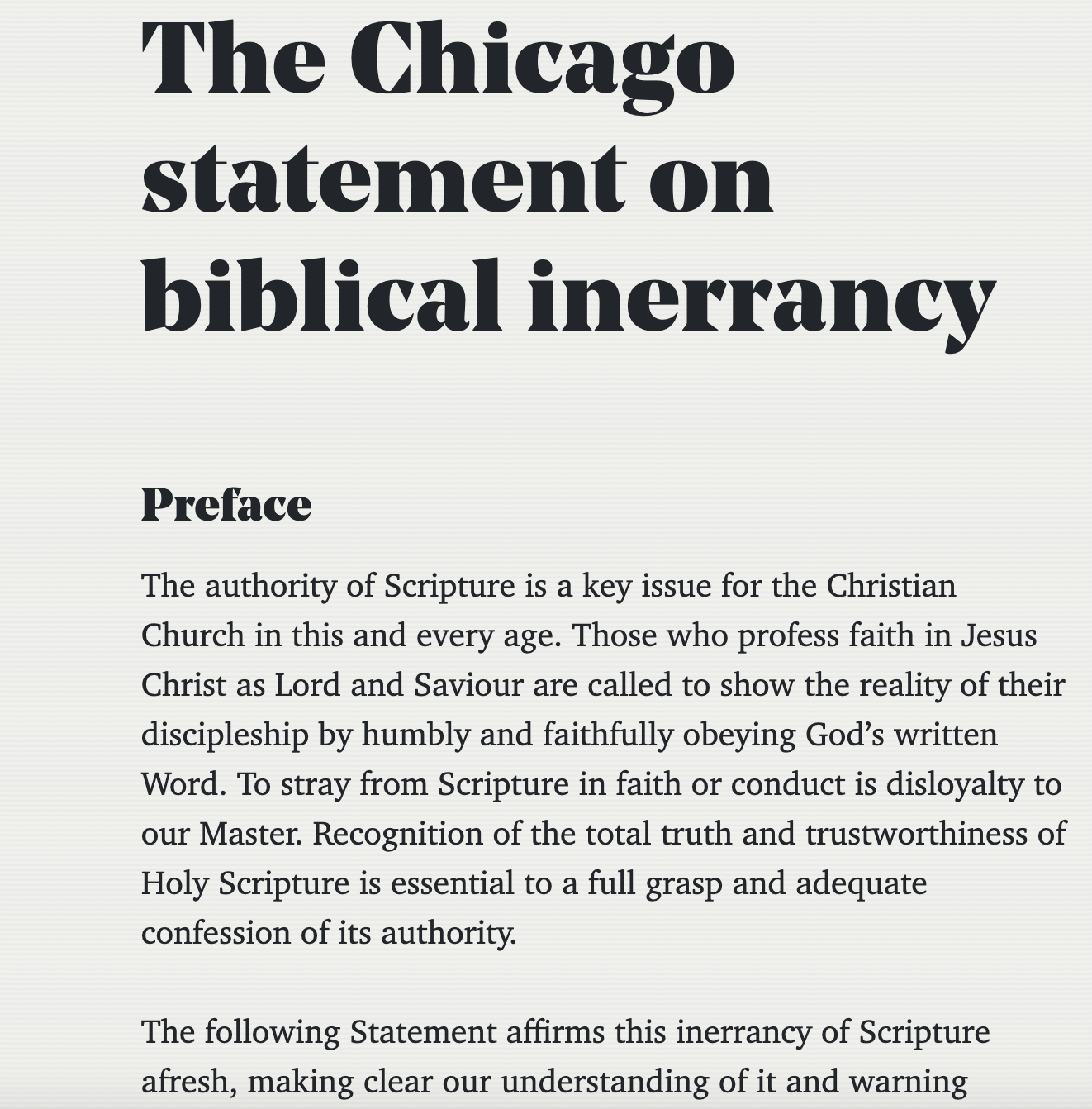Lesson 1: Laying the Foundation
The Subject of Our Interpretation
It would hardly be worth your time to take this course if we were talking about interpreting fairy tales. Read them however you want. What would it matter if you understand them correctly or not? Nothing hangs on that.
But that is not our situation because the Bible is unique. It is the word of God. Therefore we aim to interpret the Bible as the Author intends for us to understand his Book. And as we saw in the previous lesson step, our success in this aim matters big time. The reason this is so is due to the gravity of the Book we are attempting to interpret. It is the very Word of the Lord—if anything matters, this matters.
So before we examine the principles we use to interpret the Bible, we need to come face to face with what we are dealing with. Namely, the fact that God wrote a book.
Infallible and Inerrant
God’s Word is perfect—without any defect or error. It is sure—always standing true. It is right—without compromise. It is pure—without any defilement. It is clean—suitable for worship. It is true—without any falsehood.
God is not man, that he should lie, or a son of man, that he should change his mind. Has he said, and will he not do it? Or has he spoken, and will he not fulfill it? —Numbers 23:19
The law of the Lord is perfect, reviving the soul; the testimony of the Lord is sure, making wise the simple; the precepts of the Lord are right, rejoicing the heart; the commandment of the Lord is pure, enlightening the eyes; the fear of the Lord is clean, enduring forever; the rules of the Lord are true, and righteous altogether. —Psalm 19:7–9
Paul, a servant of God and an apostle of Jesus Christ, for the sake of the faith of God's elect and their knowledge of the truth, which accords with godliness, in hope of eternal life, which God, who never lies, promised before the ages began and at the proper time manifested in his word through the preaching with which I have been entrusted by the command of God our Savior; —Titus 1:1–3, emphasis mine
How does the Bible's infallibility and inerrancy fuel your desire to interpret it rightly?
Log in / create an account to enroll or continue where you left off.
 The Chicago Statement on Biblical Inerrancy
The Chicago Statement on Biblical InerrancyThis statement affirms and proclaims the vital truth of the Bible's inerrancy.
Authoritative
Scripture cannot be broken.
Jesus (John 10:35b)
True, we can break God’s commands. But we cannot break the Scripture that declares divine judgment upon our law-breaking. God’s Word is sure and it is utter foolishness to argue this fact.
“All flesh is like grass and all its glory like the flower of grass. The grass withers, and the flower falls, but the word of the Lord remains forever.” —1 Peter 1:24-25a
But who are you, O man, to answer back to God? —Romans 9:20a
Yet at the same time, it is important to note that it is the text itself that is authoritative, not its human authors. The words of first and second Peter are altogether perfect, but that does not mean that Peter did not err (Galatians 2:11-14). His words recorded in Scripture are truth despite his personal imperfections because of the special work of the Holy Spirit as he wrote.
For no prophecy was ever produced by the will of man, but men spoke from God as they were carried along by the Holy Spirit. —2 Peter 1:21
How does the Bible's authority fuel your desire to interpret it rightly?
Log in / create an account to enroll or continue where you left off.
The authority of Scripture is a key issue for the Christian Church in this and every age. Those who profess faith in Jesus Christ as Lord and Saviour are called to show the reality of their discipleship by humbly and faithfully obeying God’s written Word. To stray from Scripture in faith or conduct is disloyalty to our Master. Recognition of the total truth and trustworthiness of Holy Scripture is essential to a full grasp and adequate confession of its authority.
From The Chicago Statement on Biblical Inerrancy
Historical and Theological
The Bible is a book of reality. This includes both spiritual and physical realities, both ultimate realities and their shadows. To reduce the Scripture to hold a spiritual message alone is to destroy its spiritual message. For instance, the spiritual reality of believers being raised to new life with Christ now (Ephesians 2:5-6) is inseparable from the physical resurrection of Jesus.
And if Christ has not been raised, then our preaching is in vain and your faith is in vain. —1 Corinthians 15:14
Likewise, although Jonah’s three day residence in the belly of a great fish speaks to something greater in the death of Jesus (Matthew 12:40), that in no way precludes the fact that Jonah really was swallowed by that fish. If that is what the text tells us physically happened (and it does), then it happened.
It is just like the Creation, the Flood, and the Passover. These are things that really happened, but also things that point to ultimate realities later to come in the New Creation (2 Corinthians 5:17; Revelation 21:1ff), Judgment (2 Peter 3:5-7), and Cross (1 Corinthians 5:7).
Translatable
Learning the original languages of the Bible is most certainly a worthy endeavor that will allow you to interpret more accurately. But right understanding of the text does not depend upon this. The reason is found in the fact that it is not the shape of the letters or pronunciation of the words which is of significance, but rather the meaning the words carry. And while letter shape and pronunciation do not translate, meaning does.
The validity of Bible translations as a source for true interpretation is confirmed by the example of the Scriptures themselves. In considering the fact that the New Testament authors, writing in Greek, frequently quote the Greek translation of the Old Testament (originally written in Hebrew) that was available to them at the time, Roger Nicole makes a very important deduction.
[The New Testament writers’] willingness to make use of the Septuagint, in spite of its occasional defects, teaches the important lesson that the basic message which God purposed to deliver can be conveyed even through a translation. —The Right Doctrine from the Wrong Texts?, Kindle ed., loc. 177-178.
That is to say, the New Testament quotes a translation of the Old Testament as authoritative, demonstrating via example that honest (though imperfect) translations of the Bible are a valid means to understand and obey God’s word.
Hard and Clear
Finally, we would be remiss to not mention the fact that the Bible can also be hard to interpret. If it were not so, there would be no reason for this course! But the way we are to approach the difficulty may surprise you. Consider how Peter and Paul each speak of Paul’s writings (along with the rest of the Scriptures).
There are some things in them that are hard to understand, which the ignorant and unstable twist to their own destruction, as they do the other Scriptures. —2 Peter 3:16b
Think over what I say, for the Lord will give you understanding in everything. —2 Timothy 2:7
The Scriptures can be hard to understand. Ignorance and instability can cause us to twist them. But through thoughtfulness and the Lord’s help comes understanding.
Thus, that is what the rest of this course will contain. You will find no magic keys to interpretation or hermeneutical secrets—just biblically informed thoughtfulness and lots of prayers to God for understanding. For our concern is not to show how sophisticated and academic we can be, but to humbly submit to our Creator and Lord. Indeed, God has not hidden his Word beyond our reach. It is in our mouths and in our heart so that we might hear, understand, and obey it.
For this commandment that I command you today is not too hard for you, neither is it far off. It is not in heaven, that you should say, ‘Who will ascend to heaven for us and bring it to us, that we may hear it and do it?’ Neither is it beyond the sea, that you should say, ‘Who will go over the sea for us and bring it to us, that we may hear it and do it?’ But the word is very near you. It is in your mouth and in your heart, so that you can do it. —Deuteronomy 30:11-14
Holy Scripture, being God’s own Word, written by men prepared and superintended by His Spirit, is of infallible divine authority in all matters upon which it touches: it is to be believed, as God’s instruction, in all that it affirms; obeyed, as God’s command, in all that it requires; embraced, as God’s pledge, in all that it promises.
From the Chicago Statement on Biblical Inerrancy
 The Origins of the New Testament Canon
The Origins of the New Testament CanonA connected subject not covered in this course is the canonization of Scripture (i.e. how the different books of the Bible were compiled). For those interested in this topic, consider this free course.